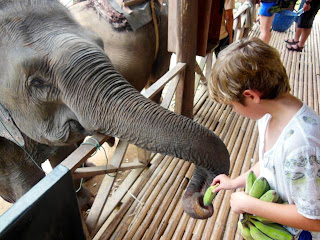 We were awoken early our first day in Laos to music pulsing
from temples and gatherings in the streets as Laotians welcomed their New
Year. Everyone flocked to the temples
with buckets of flowered water to wash the Buddha statues and give thanks and prayers
to their ancestors and to make their wishes for the coming year. It was joyous and very moving to participate
alongside the Laotians in their beautiful tradition of giving thanks.
We were awoken early our first day in Laos to music pulsing
from temples and gatherings in the streets as Laotians welcomed their New
Year. Everyone flocked to the temples
with buckets of flowered water to wash the Buddha statues and give thanks and prayers
to their ancestors and to make their wishes for the coming year. It was joyous and very moving to participate
alongside the Laotians in their beautiful tradition of giving thanks.
We had a sobering experience the following day visiting the
COPE museum and learning what happened when Laos was caught in the Vietnam War
that was raging on its Eastern border.
The North Vietnamese used the Ho Chi Minh Trail through Laos to shuttle
its troops and supplies to fight the war in South Vietnam. The US wanted to stop the supply lines and
thus Laos became the most heavily bombed country ever – despite the fact that they
were never officially even in the war. On
average, there was a bombing mission every 8 minutes, 24 hours a day for 9 years, dropping thousands of bombs each time. About 30% of the cluster bombs never exploded upon
impact and, 40 years later, they still exist in the ground, causing
casualties and hindering farmers and other people going about their daily
lives. Luke decided to write a letter to
President Obama and the American Ambassador in Laos asking why we weren’t doing more to clean up our mess (see attached).
 After a few days in the capital of Vientiane, we headed
north to Luang Prabang, a picturesque, quiet, travelers’ town along the Mekong
River. Here we tried to stay cool in the
95 degree heat by taking boat trips up the river to Buddhist Caves, jumping off
rope swings into refreshing waterfalls, and bathing friendly elephants in the
river.
After a few days in the capital of Vientiane, we headed
north to Luang Prabang, a picturesque, quiet, travelers’ town along the Mekong
River. Here we tried to stay cool in the
95 degree heat by taking boat trips up the river to Buddhist Caves, jumping off
rope swings into refreshing waterfalls, and bathing friendly elephants in the
river. 
Laos is a communist country of only 7 million people who make on average $1,100/year. Although income is not high, people seem to be healthy and happy, and there is a vibrant feel to the country that fills you with life. Based on the attitude of the people and the unbridled capitalism, Laos is clearly not an old Soviet-style communist country. The economy is sustained by small businesses, many supporting the tourist trade. We even visited a hip-hop bar one night that was as Western as it gets.
 We will always remember Laos for the exuberant New Years
festival and for the visions and sounds of the villagers along the river at
sunset. As naked children giggled and
splashed in the slow moving river, men fished with make-shift nets and families
repaired their boats for work the following day. We only had one week to spend in Laos, but it
feels like we experienced one month’s worth of adventures.
We will always remember Laos for the exuberant New Years
festival and for the visions and sounds of the villagers along the river at
sunset. As naked children giggled and
splashed in the slow moving river, men fished with make-shift nets and families
repaired their boats for work the following day. We only had one week to spend in Laos, but it
feels like we experienced one month’s worth of adventures. 





















































